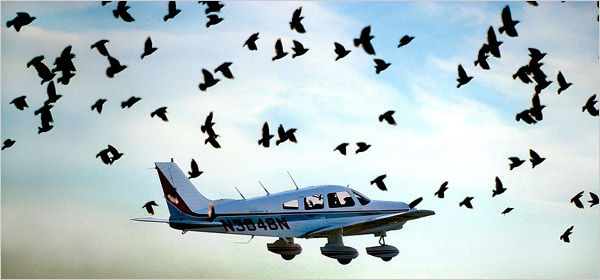Last week, while flying in Fort Collins, I had an experience that many pilots have to deal with at one time or another in their career. I had just taken flight and had reached 15 feet in altitude when a red-tailed hawk flew up from the runway and hit us in the front nose gear! We had to abort the flight and realized shortly after that the crash had broke the taxi light mounting and had bent the nose gear door. Fall is upon us and with temperatures dropping we can expect to see more wildlife emerging. As pilots, we need to be extra alert of the wildlife near the runway to make sure we decrease the likelihood of these types of crashes.
Scan the runway for possible wildlife strikes prior to take-off
Many birds of prey are attracted to the small rodents that live alongside the runway and in the fields nearby. It’s important to take a moment to make sure that these birds are nowhere near the runway before you start your flight.
Take off just after another aircraft has landed
Once an aircraft has landed, it is very unlikely to see animals on the runway. By this point the loud sounds of the plane have scared them away, making it safe for take-off.
Clear the runway with a low fly-by
When approaching the runway to land, make sure you clear it with a low fly-by. This acts as an announcement to nearby wildlife and strongly encourages them to stay out of the way.
Scan for “traffic”
When turning final, scan the runway with the same methods you usually use for traffic scanning. Take precaution and scan it sections at a time.
Communicate your findings
If you end up having a wildlife encounter or spot an animal too close to the runway, report your findings to ATC, Tower, Ground Controller and/or Unicom. It’s vital that you communicate the presence of animals, to help other aircrafts avoid these type of encounters. You can also submit wildlife strikes directly to the FAA.
Keep Flying
If you hit a bird or another animal, continue to fly the plane under any means possible! After a safe return, make sure you exit the runway and as mentioned earlier, report your findings.


